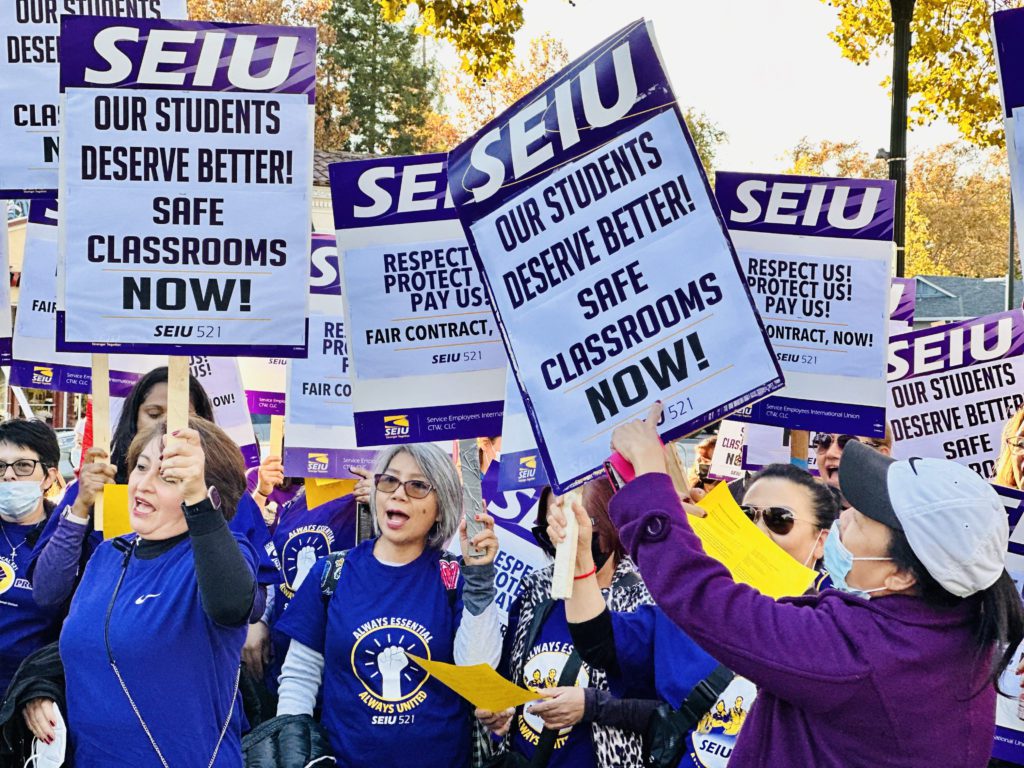More than 100 Santa Clara County special education workers in violet shirts emblazoned with phrases like “Together we rise,” chanted “Hey hey! Ho ho! Unsafe classrooms got to go!” as cars blasted horns in support.
The Tuesday rally is the latest action taken by SEIU Local 521, a union that represents about 700 county special education workers, to demand safer working conditions. The group filed an official complaint with the federal Occupational Safety and Health Administration against the Santa Clara County Office of Education on Nov. 7, alleging a history of understaffing and undertraining—resulting in increased worker injuries.
Rahel Gezmu, a paraeducator of eight years, protested even as the sun set on the chilly fall afternoon. Gezmu started her paraeducator career after leaving a job at a senior care residence, and said she just wants the county to listen to workers.
“We need respect,” Gezmu told San José Spotlight. “I wish they can come and work for one hour… If they see it, they (can) understand us.”
As the county and school districts deal with low teacher recruitment, substitute teacher shortages and upticks in student behavioral issues, special education employees, known as paraeducators, are working alongside students who have moderate to severe disabilities. These students need more support as paraeducators simultaneously teach and help students take care of basic needs like eating. Yet the worker pool has yet to recover from COVID-19 pandemic layoffs.

Love and pain
Enrique “Henri” Muñoz Jr. and Christina Muñoz are the type of siblings that finish each other’s sentences. Born one year apart, the duo grew up in East San Jose, attended special education classes and now both work for the county’s education office. Generations of students have walked through doors to ask if Mr. Muñoz and Ms. Muñoz are related.
Henri has been a paraeducator since 2010. Christina has a master’s degree in special education from San Jose State University and works as a special education teacher.
“This has been basically part of our whole lives,” Henri told San José Spotlight. “People like us know it inside and out.”
But their jobs are demanding more than the Muñoz siblings can give.
In March 2017, a loud commotion prompted Henri to run out of his class to the one next door. A student, who despite his young age matched Henri in build, was visibly upset and trying to topple filing cabinets. As Henri worked to calm the student while other teachers evacuated the class, the student punched Henri in the face, causing him to momentarily black out.
“I basically jumped in and used my body as a shield for the other students,” Henri told San José Spotlight. “My diagnosis was whiplash.”
When Christina got the call about her older brother’s injuries, she rushed to the hospital feeling anxious and angry, she said.
“I remember I freaked out,” Christina told San José Spotlight. “When they told me what happened to my brother, I was furious… We’re human beings too.”
For Henri, it was just another day at work. But when a bite into a carrot some time later made his jaw surge with pain, he questioned how much impact that one punch left.
“We overlook little pains just because it sort of comes with the whole deal,” Henri told San José Spotlight. “I felt something (was) not right, but it wasn’t until a few months later, I was like, ‘Why are my teeth hurting?’”
Five years later, Henri said he has permanent joint dysfunction and his jaw may develop arthritis. He’s still a paraeducator, but his daily routine now includes jaw and tongue exercises.
Understaffing results in injuries like his are becoming more common, Henri said, and inadequate pay deters new paraeducators from filling vacant roles. Paraeducators work full-time but are only paid for 6.5 hours to match the school day’s hours. Henri works weekends as a phlebotomist and said he can’t afford his one-bedroom apartment without his partner, potentially facing homelessness if something happens.
“They think that we’re dispensable,” Henri told San José Spotlight.
Christina said working at the county is a mixture of love and pain. She wants to use her experiences to pursue a doctorate, but she said her family continues to live with her brother’s injury and helps with his medical bills.
“The people that run (the county’s education office) don’t take the time to come to our classrooms, to talk to our educators, to acknowledge them,” Christina told San José Spotlight. “Our kids are the ones that are being affected because of this.”
Contact Loan-Anh Pham at [email protected] or follow @theLoanAnhLede on Twitter.



Leave a Reply
You must be logged in to post a comment.